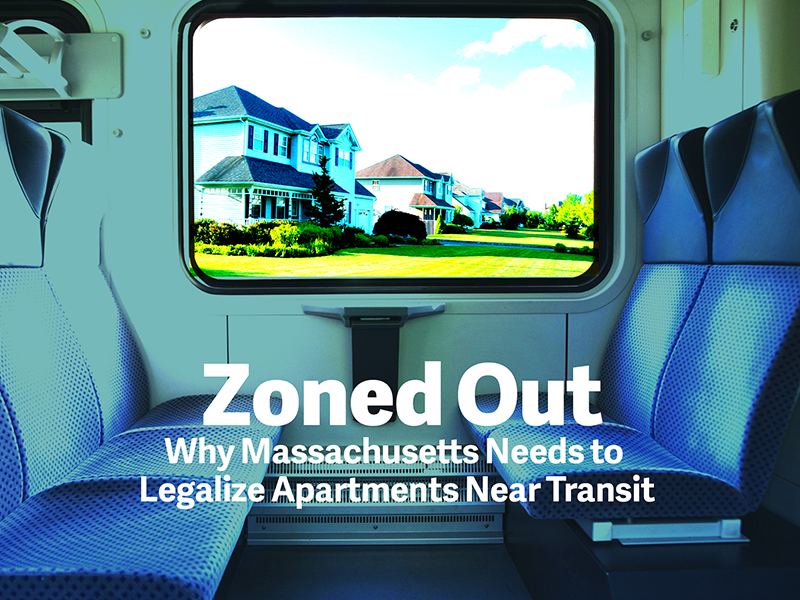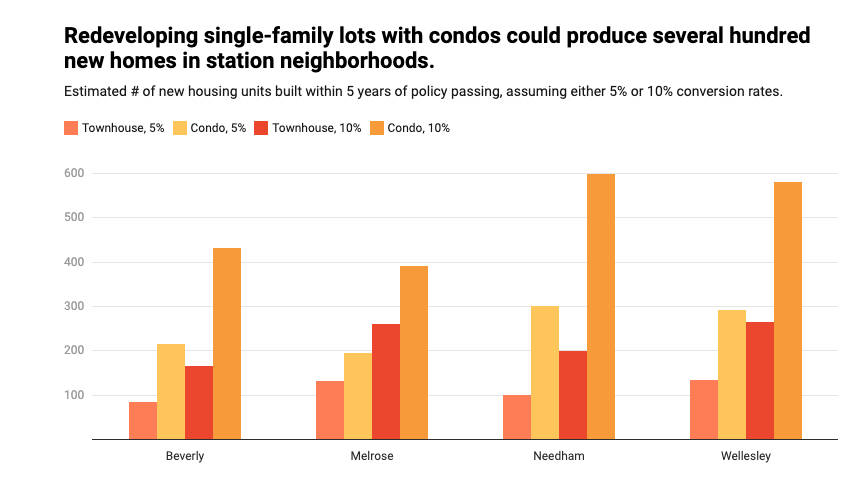Boston Indicators, Brookings lay out statewide zoning change to increase housing density near transit, expand affordability
Reform could create affordable opportunities for working families
October 21, 2020
Boston – A single statewide change to zoning restrictions near transit hubs could enable the development of moderately-priced housing in some of the region’s most in-demand communities, alleviating Greater Boston’s housing affordability crisis. That’s the central theme of a new proposal by Boston Indicators and the Brookings Metropolitan Policy Program released today at the Boston Foundation.
The proposal, spelled out in Zoned Out: Why Massachusetts Needs to Legalize Apartments Near Transit, estimates that a statewide policy allowing for up to 20 units of housing per acre within ½ mile of all transit stations would create the opportunity to develop townhouse, condominium or apartment units near dozens of transit stations.
“As our local economy has grown, zoning restrictions in many communities have artificially intensified our housing affordability crisis,” said Paul Grogan, President and CEO of the Boston Foundation. “These dynamics have squeezed current residents and discouraged others from ever moving here in the first place, hampering our regional competitiveness. This proposal helps unwind restrictions that make it difficult for middle-class families to own homes, build equity, and stay in the region.”
Undoing those decades of restrictions would require removing or overriding zoning rules that prohibit multi-family housing, require large minimum lot sizes, or add onerous restrictions to approval of multi-family housing. In their analysis, the Indicators and Brookings researchers show how legalizing apartments could enable infill redevelopment near suburban commuter rail stations by converting parcels currently used as single-family homes into moderate density multi-family lots.
Exploring four commuter rail stations as case studies – Wellesley Hills, Beverly Farms, Needham Heights and Melrose Cedar Park, the researchers show that converting just 5 percent of lots from single-family to multi-family would create nearly 500 townhouse units or 1000 condominium units across the case study communities (see chart below – fully interactive charts are available on the report website). That number jumps to nearly 2000 condominiums with a 10 percent conversation rate.
“The research shows that it doesn’t require a massive shift in construction to make a substantial difference in housing availability, with all the positive impacts on diversity and affordability, and a slowing of runaway housing prices that ultimately hurt the overall health of the community and region,” said Luc Schuster, Senior Director of Boston Indicators, the research center of the Boston Foundation. Schuster noted that the most significant affordability improvements would come in communities that today are the highest-priced and have the largest lot sizes. In these affluent suburbs, new housing could, for the first time in memory, be accessible to families earning under $100,000 a year, unlocking new opportunities for families to live with access to quality jobs and transit.
“Upzoning affluent cities and towns would be a significant first step in addressing the regional housing crisis. Allowing more housing in high-income suburbs takes some of the pressure off lower- and middle-income communities that are building the largest share of new housing now,” said Jenny Schuetz, Fellow at the Metropolitan Policy Program at Brookings, who co-authored the report.
To better understand the potential pathways and impacts of a statewide zoning change, the report also includes a landscape analysis of other states where similar zoning changes have been proposed or put in place – including Minneapolis, which became the first major U.S. city to eliminate single-family-exclusive zoning in December 2018, and Oregon, which passed the first successful statewide law ending single-family-exclusive zoning in 2019.
The new report, Zoned Out: Why Massachusetts Needs to Legalize Apartments Near Transit, is available online at bostonindicators.org.

